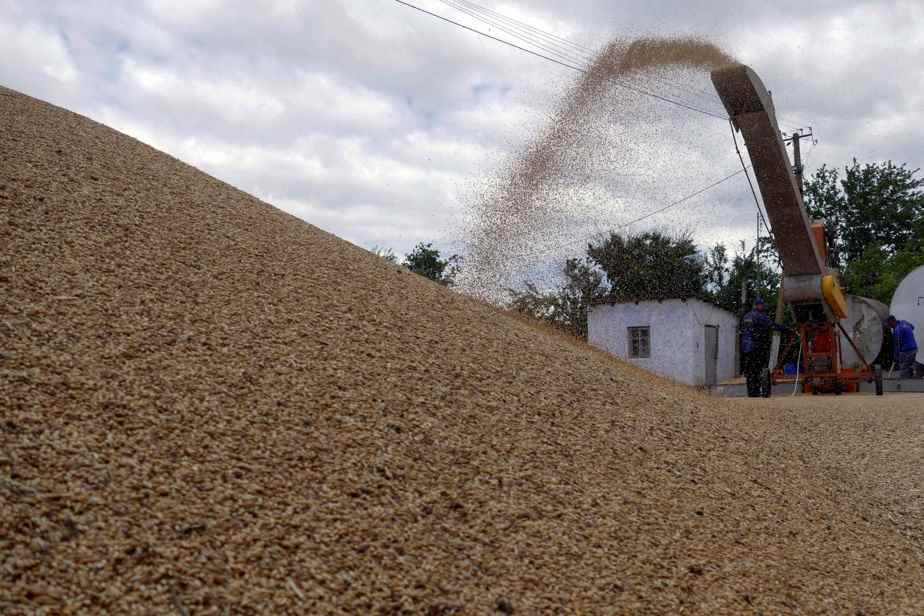The war unleashed in Ukraine by Russian President Vladimir Putin is having catastrophic effects on the Ukrainian population: millions of families have had to flee or are trying to survive, thousands of people are dead, entire towns are destroyed, their historical heritage and cultural too. Large-scale devastation. Even the Russian population is suffering from the actions of its new tsar, its democratic power having been undermined. Thanks to insidious government propaganda, the vast majority of the Russian population supports its president. But this war is also in the process of affecting a significant part of the world’s population.
Posted at 2:00 p.m.
A major food crisis is looming on the horizon. It will affect the most vulnerable populations on the planet, particularly in Africa. The World Food Program (WFP) no longer has access to its usual sources of supply in Ukraine and Russia. With the departure of millions of Ukrainians, it is uncertain whether the country will be able to carry out the usual harvests, further limiting access to food. Grain silos are full of previous harvests but ports in southern Ukraine are blocked by war. This results in soaring food prices, especially in countries dependent on imports from Ukraine, which can cause social and economic chaos.
More than 100 million additional people could suffer from famine or acute hunger in 2022, unprecedented on the planet. Food already represents on average more than 40% of family expenditure in sub-Saharan Africa.
The President of Senegal, Macky Sall, also representing the African Union, even traveled to Moscow to plead the cause of the African populations who are suffering from the effects of this war, but without success.
The global economy is being hit hard and the risk of a global recession, coupled with inflation, is fast approaching. This very dangerous situation for low- and middle-income families in our countries is fueled by soaring oil prices as well as by the increase in food prices. Even the energy transition is slowed down by the sudden increase in the use of coal to replace Russian oil.
Coming out of two years of the COVID-19 crisis, the world was beginning to regain hope. Various governments around the world, encouraged by their populations, resumed their pilgrim’s staffs, to pursue the commitments made in Paris in 2015 to limit the increase in greenhouse gases, as well as those made at the UN the same year. to achieve the objectives of the 2030 Agenda to fight poverty and inequality. And then VLAN! Putin attacks!
The Secretary General of the United Nations is now coldly warning us of the major consequences of this war. “The impact of war on food security, energy and finance is systemic, severe and accelerating. For people around the world, war threatens to unleash an unprecedented wave of hunger and misery, leaving social and economic chaos in its wake. »
It is immoral to block access to food for the most vulnerable populations and even to make it a bargaining chip. Faced with this catastrophic situation, Canada and its international partners must spare no effort to get Russia and Ukraine to reopen the Black Sea grain ports.
At the same time and without delay, we must take stock of our grain reserves to determine what can be redirected to the countries that will be struck by famine due to the lack of Ukrainian and Russian supplies.
Already the WFP sees itself under the obligation to reduce the food distributed to certain populations at risk in order to send it to other populations who suffer even more from hunger. This situation is absolutely unacceptable, shameful and inhuman.
Europe has decided to launch a boycott of Russian products and to stop importing Russian oil. The international community has implemented economic sanctions that put a lot of pressure on the Russian government and the oligarchs who support it. Investigations are underway and more are to come to bring those responsible for war crimes to justice. We must prevent this model of warlike behavior from spreading among other archaic rulers. As members of national and international civil society, we call on our government to stay the course and encourage its partners in the international community to increase pressure to end the conflict. We must do everything to stop this madness.
* The GREDIC is made up of former leaders of international cooperation organizations: Robert Letendre, Nigel Martin, Mario Renaud, Nicole St-Martin and Pierre Veronneau. It is associated with the Observatory of Crises and Humanitarian Aid (OCCAH) of UQAM.

